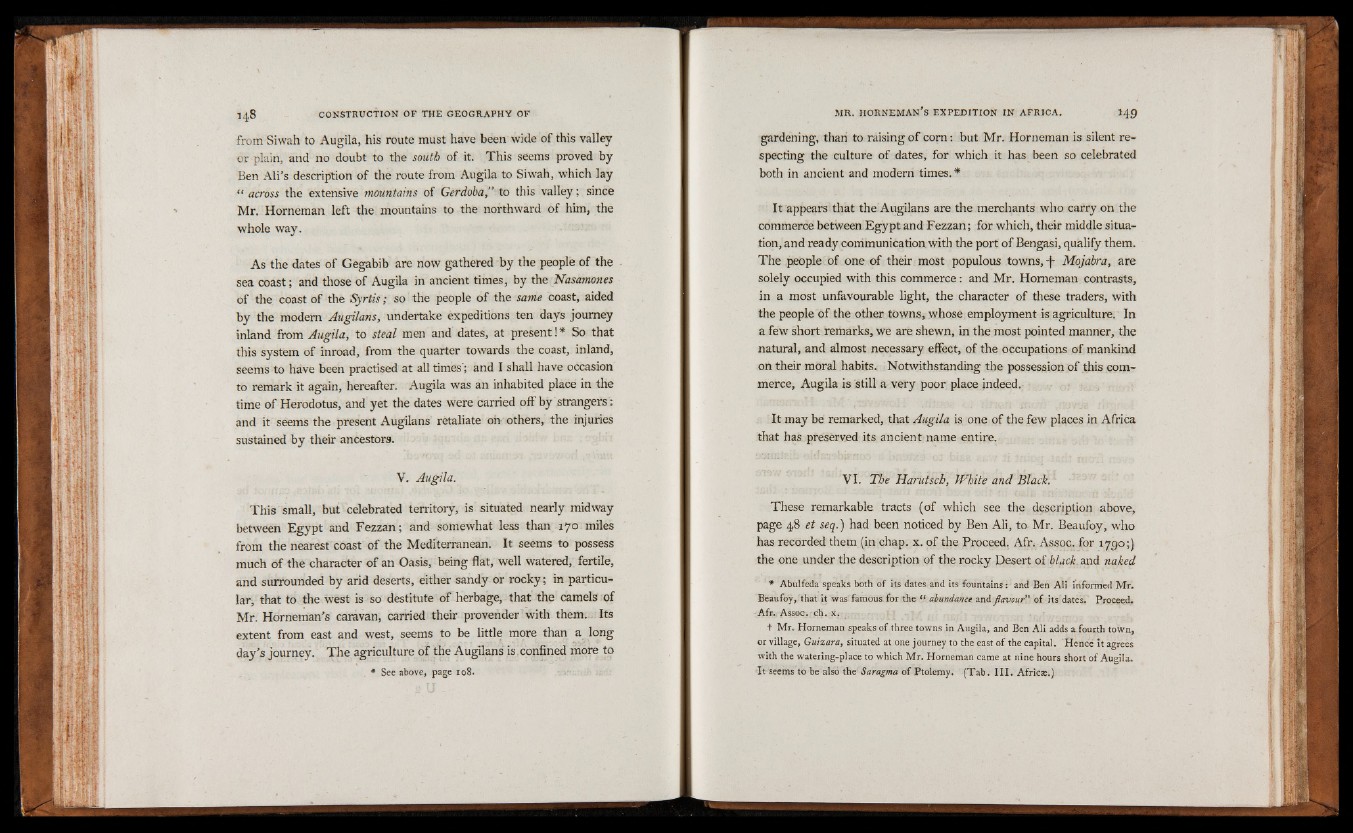
from Siwah to Augila, his route must have been wide of this valley
or plain, and no doubt to the south of it. This seems proved by
Ben Ali’s description of the route from Augila to Siwah, which lay
“ across the extensive mountains of Gerdoba,” to this valley; since
Mr. Horneman left the mountains to the northward of him, the
whole way.
As the dates of Gegabib are now gathered by the people of the
sea coast; and those of Augila in ancient times, by the Nasamones
of the coast of the Syrtis; so the people of the same coast, aided
by the modem Augilans, undertake expeditions ten days journey
inland from Augila, to steal men and dates, at present! * So that
this system of inroad, from the quarter towards the coast, inland,
seems to have been practised at all times’; and I shall have occasion
to remark it again, hereafter. Augila was an inhabited place in the
time of Herodotus, and yet the dates were carried off by strangers:
and it seems the present Augilans retaliate on others, the injuries
sustained by their ancestors.
V. Augila.
This small, but celebrated territory, is situated nearly midway
between Egypt and Fezzan; and somewhat less than 170 miles
from the nearest coast of the Mediterranean. It seems to possess
much of the character of an Oasis, being flat, well watered, fertile,
and surrounded by arid deserts, either sandy or rocky; in particular,
that to the west is so destitute of herbage, that the camels of
Mr. Horneman's caravan, carried their provender with them... Its
extent from east and west, seems to be little more than a long
day's journey. The agriculture of the Augilans is confined more to
* See above, page 108.
gardening, than to raising of corn : but Mr. Horneman is silent respecting
the culture of dates, for which it has been so celebrated
both in ancient and modern times. *
It appears that the Augilans are the merchants who carry on the
commerce between Egypt and Fezzan; for which, their middle situation,
and ready communication with the port of Bengasi, qualify them.
The people of one of their most populous towns, -j- Mojabra, are
solely occupied with this commerce : and Mr. Horneman contrasts,
in a most unfavourable light, the character of these traders, with
the people of the other towns, whose employment is agriculture. In
a few' short remarks, we are shewn, in the most pointed manner, the
natural, and almost necessary effect, of the occupations of mankind
on their moral habits. Notwithstanding the possession of this commerce,
Augila is still a very poor place indeed.
It may be remarked, that Augila is one of the few places in Africa
that has preserved its ancient name entire.
VI. The HarutSch, White and Black.
These remarkable tracts (of which see the description above,
page 4,8 et seq.) had been noticed by Ben Ali, to Mr. Beaufoy, who
has recorded them (in chap. x. of the Proceed. Afr, Assoc. for 1790;)
the one under the description of the rocky Desert o f black and naked
* Abulfeda speaks both of its dates and its fountains: and Ben AH informed Mr.
Beaufoy, that it was famous, for the “ abundance and flavour" of its dates. Proceed.
Afr. Assoc, 'clj. x.
t Mr. Horneman speaks of three towns in Augila, and Ben Ali adds a fourth town,
or village, Guizara, situated at one journey to the east of the capital. Hence it agrees
with the watering-place to which Mr. Horneman came at nine hours short o f Augila,
It seems to be also the Saragma of Ptolemy. (Tab. I I I . Africæ.)